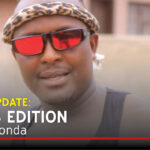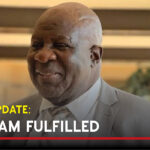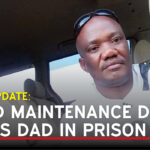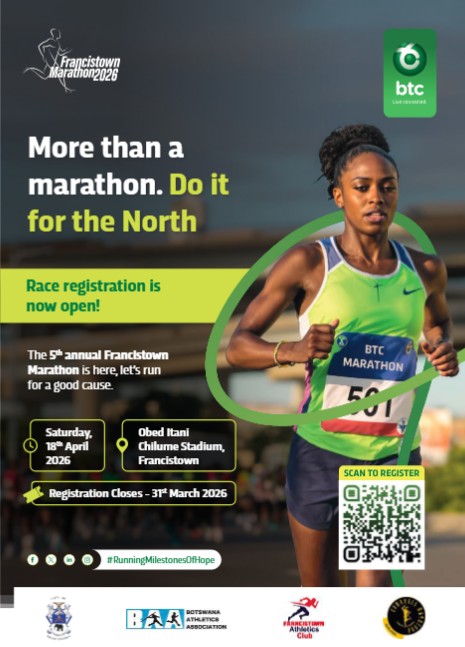A former 200m runner who represented Botswana at the 1996 Olympics in Atlanta, Justice Dipeba is now one of the top coaches in the country.
The 47-year-old Mogoditshane man has played a key part in the development and rise of star athletes such as Isaac Makwala and Christine Botlogetswe.
Dipeba’s journey into the world of coaching started back in 2000 as an Aerobics instructor at Auburn University Intramural Service, Alabama in the USA, where he was studying for a Bachelor of Science in Physical Education.
As well as Athletics, the father-of-two has coached in Football, Hockey, Volleyball, Swimming, Softball, and Cricket.
Dipeba, a two-time winner of the Botswana Sports Awards Coach of the Year, is currently the Botswana national team coach and also coaches the UB’s Athletics team.
The Voice’s Portia Mlilo tracked down this passionate mentor to talk about his coaching career and plans for the Olympic Games.
What inspired you to take up coaching?
It is something that I have enjoyed, even during my time as an athlete.
I was lucky to have worked with some of the good coaches we had in the country during that time, especially Adam Letham, who I regard as a teacher, coach, and mentor.
The passion started to develop while I was a student in the USA.
I happened to work with one of the most experienced coaches in the world – the head coach of the 1992 USA athletics Olympic team, Mel Rosen.
He was also my coach and lecturer.
Seeing that coaching is not only running/sports but building a better person and changing someone’s life, I knew that this was something I wanted to do.
How did you end up as a national team coach?
This is something that just came along as my athletes were performing well and also being selected to represent the country at major international games.
Since becoming Isaac Makwala’s coach in 2013, the ‘bad man’ has improved beyond belief, emerging as one of the best athletes in the world. What have you made him do differently?
The best thing I have done with Isaac was to build a good relationship of understanding each other as coach and athlete.
I think all I did was show him that he has the potential.
He is a talented and very dynamic athlete.
Our athlete-coach relationship was built around massive respect, passion, and dedication.
One other thing is Makwala respects himself, his sport, and he does everything right regarding sports.
This has helped him to develop and believe that he can be one of the best in the world.
At the upcoming Tokyo Olympics, in your opinion should Makwala opt for the 400 or 200m individual race?
As I just mentioned, Isaac is a very dynamic athlete.
If the Athletics timetable allows us in Tokyo, we will do both events and he stands a very good chance to perform well.
So we will gauge our chances as the competition gets closer and only then will we make a decision.
As a coach, what do you look for in terms of talent identification?
There are a lot of things depending on the sport and the event.
For sprint events, we will look at agility, speed, coordination, power, and body structure.
Mind you, some of these things you can train but it is good to have them right from the beginning.
Take us through a typical day at a major competition, how does it play out and what do you focus on?
Mostly at this time, there is very little that you can do – but also a lot that you can do to lose a race!
Preparation, mostly mental, is the key to this day.
You have to believe and stay positive about your performance.
Sleep at the right time, eat at the right time.
Get to the venue at the right time and do the warm-up at the right time.
What is your target for the Olympics, which are now just two months away?
Our target is to compete for podium finishes.
Our athletes are on a form so it is possible.
What would you say are some of your greatest achievements as a coach?
Coaching Makwala who has: won a Gold medal at the Commonwealth Games, won the Diamond League trophy, won Gold medals at the Continental Games and Championships.
He has also represented Africa at the continental cup and is ranked as one of the top 10 fastest men in 400m history.
Makwala is also the first man to run 400m under 44 seconds and 200m under 20 seconds on the same day.
As a coach, I have won Botswana Sports Awards Coach of the Year two times.
And on the opposite end of the scale, what are some of the lowlights of your coaching career?
Most of my disappointments have been where I see talented athletes throwing away their talents by doing avoidable things.
Drinking alcohol, quitting the sport at a very tender age.
I have lost a couple of athletes who I think could have only listened and changed their behavior they could have been far by now.
Back to the positive, what do you enjoy most about coaching?
Being able to change and touch so many lives not only on the track but also at a personal level.
I think that is something that is within the coach’s system.
What challenges do you face as a coach?
As a coach, you can face a lot of challenges.
You find a lot of young athletes who think they know a lot about sports.
They will challenge you, try and do their own program and these things have destroyed most of them.
They end up getting injuries by overtraining themselves.
The other challenge is the demand from the public, wanting the results, not understanding that we have very limited resources.
We are volunteers and I end up wearing many hats due to the circumstances on the ground.
What does it take for one to rise to the top in terms of coaching?
Coaching is a process, you learn everyday.
The best thing that you can do as a coach is to work on your relationship with your athletes.
Coaching does not just happen, for me, I think it’s a calling.
How easy or difficult is it to be a national team coach?
It is not easy, as all eyes are on you to produce the results, no matter what challenges you go through in terms of preparing for competition.
When the team is not performing people blame the coach.
People have no idea of the process and difficulties that you face to compete with the world.
In my case where I volunteer my time, it is always going to be difficult to match the world out there.
I have to juggle between my work and the coaching of the national team.
How has Covid-19 affected your plans in preparing athletes for the Games?
Covid has affected our plans big time.
We were not able to train well as they were so many lockdowns and stadiums were closed.
There were very limited competitions.
Right now it is a struggle to go to Europe where we always get good competitions.
So it has been a tough year!
What advice can you give to aspiring coaches looking to take up a coaching role in athletics?
It is actually a great sport!
You have to be passionate, dedicated, disciplined, and determined.
As a coach, you get to grow as you get to learn how to deal with different individuals with different backgrounds.
Who is your inspiration?
I find inspiration in many people around me.
The person who has inspired me most was my father.
He always had a smile on his face no matter how hard things were going and he was an amazing man.
He loved everyone and he was a very positive man.
Sounds like a true inspiration! We finish as we always do, Thank God It’s Friday, what are your plans for the weekend?
There are no competitions so I will be with my wife, Lenah, and our two boys, Lefika and Katlo at the farm.




















